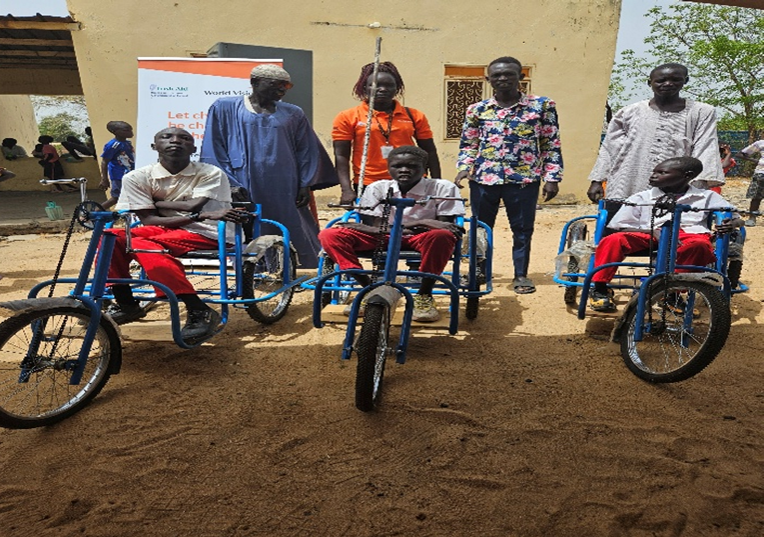Monygau’s Story: How Mobility Support Is Opening Doors for Students with Disabilities in South Sudan
Monygau is a 17-year-old boy in Melut in Upper Nile. He lives with a physical disability called spastic quadriplegic cerebral palsy. This condition causes tremors in his head and left hand, makes it hard for him to speak, and prevents him from walking upright. His father says Monygau developed the condition when he was four years old.
For many years, Monygau’s parents helped him get ready and walk to school using a stick. But during the rainy season, the ground became muddy and slippery. His stick would often get stuck, and he sometimes fell. Because of this, he missed many school days.
“I used to cry when I saw my son struggling to go to school,” his mother said.

Support from the EMPOWER Project
Things changed when the Enabling Meaningful Participation of Women and Girls for Essential Rights (EMPOWER) project, funded by Irish Aid through World Vision Ireland and managed by World Vision in South Sudan, began helping children with disabilities at Dr John Garang Primary School in 2023. EMPOWER works in 12 schools, four child-friendly spaces, two safe spaces for women and girls, and six income-generating groups in Melut County. The project focuses on supporting vulnerable women, girls, and children with disabilities, especially those affected by floods and conflict.
As part of its work, EMPOWER gave tricycles to three children at the school, including Monygau. These tricycles help them move on their own and go to school regularly. The tricycles also improve their physical health by helping to strengthen their muscles and improve balance.
Monygau’s father shared: “Before the tricycle, I had to walk with him every day. Now he goes to school by himself. I’m very thankful. It has made life easier for our family.”
Challenges for Children with Disabilities
According to the 2008 census, about 5.1% of people in South Sudan have disabilities, including many children who do not attend school. Those in school face many problems like poor learning conditions and lack of trained teachers. Many schools are not built in a way that supports children with disabilities.
Even though South Sudan’s constitution says all children should have access to education, many children with disabilities are still left behind. In 2020, the government created a National Inclusive Education Policy. This policy encourages schools to identify children with disabilities, provide assistive devices, and train teachers to support all learners better.
A Brighter Future
At Dr John Garang Primary School, the changes are clear.
“I saw Monygau smiling and riding his tricycle. When I asked him how it was, he laughed. That moment showed me how much this support has helped. It has changed the way we think about children with disabilities. Now we believe in inclusive education and a better future for all students,” said Mr Marial Tuong, the deputy head teacher.